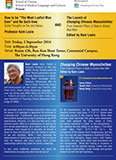Date: Friday, 2 September, 2016
Time: 4:00pm- 6:30pm
Venue: Room 4.36, Run Run Shaw Tower, Centennial Campus, The University of Hong Kong
My published work on Chinese masculinity ideals used the wenwu文武 paradigm to determine the attributes of a desirable man. Traditionally, wenwu accomplishments were publicly recognized by way of passing the keju 科举examinations. However, it is also true that once a man achieves public office as a consequence of passing the civil service examinations, he is meant to be an upright gentleman. Even though he is desirable, he himself is meant to have self-discipline and not indulge in matters of sex and emotions. While I have examined the repercussions of having wenwu on men, I did not look at what the literature said about young men’s human relationships before they attain the wenwu credentials.
In fact, most traditional romances are about the relationships of young men who have not yet sat for the examinations, and the “talented scholar and beautiful woman (caizi jiaren才子佳人)” stories were extremely popular in late imperial times. While other scholars have examined this genre quite extensively, none have explored the class nature of these pre-wenwu romances in detail. In this presentation, I will examine the love affairs of Jia Baoyu (The Most Lustful Man Ever古今天下第一淫人), the protagonist of the classic novel Hongloumeng, and see how love and sex were imagined in traditional China. I will show that ultimately, happy lovers, both hetero- and homo-, are only found when class boundaries are not transgressed. While this finding is mundane, it does show that the talented scholar, unlike men who have wenwu respectability, could indulge and pamper himself and still feel self-righteous.
Kam Louie FAHA, FHKAH is Honorary Professor at HKU and UNSW. He has 18 books under his name. Recent publications include Chinese Masculinities in a Globalizing World (Routledge 2015), Diasporic Chineseness after the Rise of China: Community, Culture and Communication (ed with Kuehn and Pomfret) (UBC Press 2013), Eileen Chang: Romancing Languages, Cultures and Genres (ed) (HKUP 2012) and 男性特质论 —— 中国的社会与性别 (江苏人民出版社 2012) [Chinese translation of Theorising Chinese Masculinity (Cambridge UP 2002).
|

